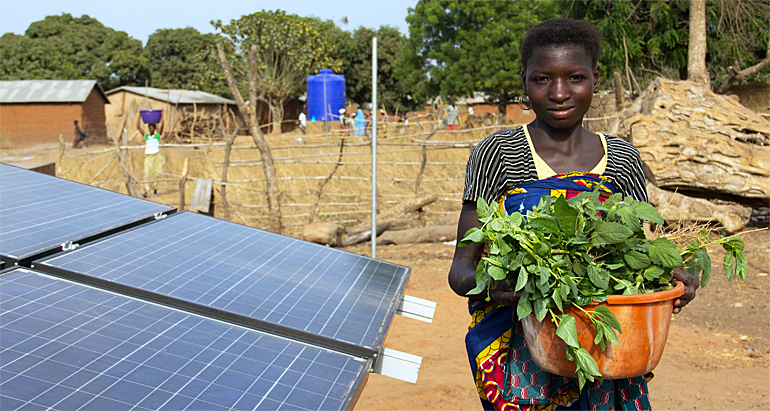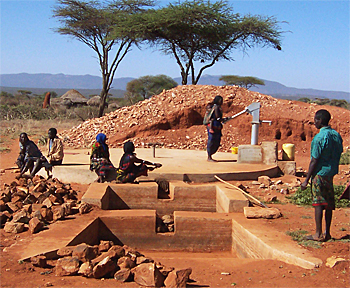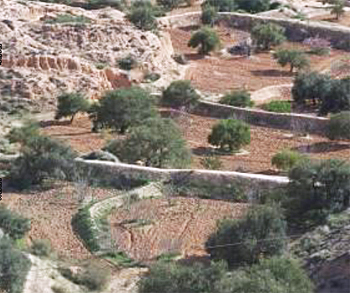NWO-WOTRO launches new scientific research programme for inclusive development Sub-Sahara Africa
 WOTRO Science for Global Development and the Dutch Ministry of Foreign Affairs launches the new programme Research for Inclusive Development in Sub-Saharan Africa.
WOTRO Science for Global Development and the Dutch Ministry of Foreign Affairs launches the new programme Research for Inclusive Development in Sub-Saharan Africa.
The scientific research programme funds research that investigates how the current growth of many African economies can be guided so that it becomes more inclusive. The programme consists of two Calls for proposals: Strategic Actors for Inclusive Development and Productive Employment.
The total available budget for funding 5,875,000 euros. Deadlines for submitting preliminary prosposals are respectively 13 November 2013 and 14 January 2014.
 Bassin for rainwater harvesting in Ethiopia.
Bassin for rainwater harvesting in Ethiopia.
Long-term sustainability of economic growth
Many African economies are growing fast, but there are concerns about the quality of this growth. Large groups of poor and vulnerable people have remained excluded from increased welfare.
The failure to structurally tackle inequalities undermines social cohesion and poses a risk for the long-term sustainability of economic growth.
Research for Inclusive Development in Sub-Saharan Africa supports research that leads to practical advice and policy descriptions for more inclusive African development through structural transformation, with specific attention to the role of strategic actors in such transformation processes and to more inclusive productive employment policies.
Two calls for proposals
The programme consists of two funding instruments: a Call for research into Strategic Actors for Inclusive Development and a Call for research into Productive Employment. Both focus on the following countries: Ghana, Benin, Mozambique, Ethiopia, Kenya, Uganda and Rwanda.
Proposals can be submitted by consortia consisting of at least one research institution and one practitioner organisation from one of the seven countries mentioned above, and one Dutch research institution. The total available budget for funding 5,875,000 euros, distributed evenly over the two Calls. For both Calls the maximum funding per research proposal is limited to 587,500 for a project of 2,5 years.
Call: Strategic actors for inclusive development

Rainfed agricullture in Tunesia with a
micro-catchment technique called jessour
The call aims at generating insights into the conditions under which actors (across state, society and economy) who potentially have the power and capacity to overcome political and institutional obstacles, will actively pursue inclusive development.
Specific objectives of the Call are to contribute to new evidence-based knowledge on effective implementation of inclusive development policies and to share this knowledge with relevant stakeholders to facilitate uptake and application.
Call: Productive employment
The aim of the Call for research on Productive Employment is to generate insights into ways in which African countries can promote productive employment, and how Dutch aid and private partners, as well as trade and investment policies can contribute to this process.
Specific objectives of the Call are to contribute to new evidence-based knowledge that can be used to improve policies and practices of all relevant actors to promote productive employment in African countries and to share this knowledge with relevant stakeholders (researchers, policymakers, other practitioners) to facilitate uptake and application.
About NWO-WOTRO
WOTRO is a division of the Netherlands Organisation for Scientific Research (NWO), and focuses primarily on scientific research on development issues, in particular poverty alleviation and sustainable development. WOTRO has its offices in The Hague, the Netherlands.
This news item was originally published on the website of NWO-WOTRO.
More information
NWO-WOTRO
programme coordinator Eva Rijkers e.rijkers@nwo.nl
The Hague, the Netherlands
+31 70 344 0653
www.nwo.nl/inclusivedevelopment
Sub-Saharan Africa cannot sustain its present economic resurgence unless it eliminates the hunger that affects nearly a quarter of its people, the United Nations Development Programme (UNDP) argues in its Africa Human Development Report 2012: Towards a Food Secure Future.



